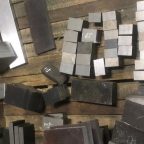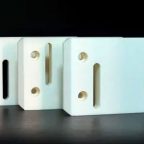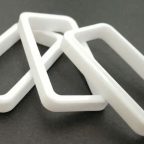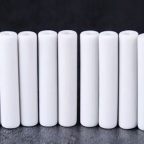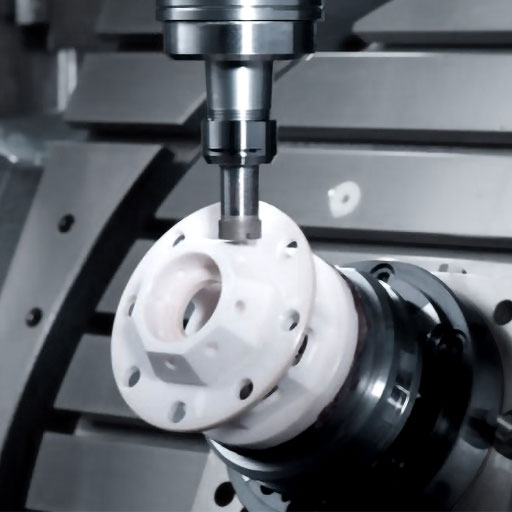Cemented Carbide Alloy is a multi-phase composite material produced by powder metallurgy with refractory metal carbide as matrix and hard phase, cobalt (nickel) as binder phase (often sintered in vacuum furnace or hydrogen reduction furnace and produced by powder metallurgy). powder metallurgy products). Carbide is widely used as tool material, such as turning, milling, planing, boring and other tools and drills, for cutting ordinary steel, cast iron, non-ferrous metals and plastics and other materials, and even for cutting tool steel, stainless and heat-resistant steel Difficult-to-machine materials (materials up to 50 HRC can be cut). The cutting speed of carbide tools is 4-7 times higher than that of high-speed steel, and the tool life is 5-80 times higher (currently the cutting speed of new carbide tools is equal to hundreds of times that of carbon steel). In addition to being used for cutting tools, cemented carbide can also be used to manufacture cold work dies, measuring tools and some wear-resistant parts. The service life of some carbide dies is more than 10 times longer than that of tool steel dies.
Cemented carbide is an alloy material made of hard compound of refractory metal and bonding metal through powder metallurgy process. Cemented carbide has a series of excellent properties such as high hardness, wear resistance, good strength and toughness, heat resistance and corrosion resistance, especially its high hardness and wear resistance, which remain basically unchanged even at a temperature of 500 °C , still has high hardness at 1000℃. Carbide is widely used as tool material, such as turning tools, milling cutters, planers, drills, boring tools, etc., for cutting cast iron, non-ferrous metals, plastics, chemical fibers, graphite, glass, stone and ordinary steel, and can also be used for cutting Difficult-to-machine materials such as heat-resistant steel, stainless steel, high manganese steel, tool steel, etc.
- Carbide Welded Inserts
- High hardness (86~93HRA, equivalent to 69~81HRC);
- Good thermal hardness (up to 900~1000℃, keep 60HRC);
- Good abrasion resistance.
- Carbide cutting tools are 4 to 7 times faster than high-speed steel, and the tool life is 5 to 80 times higher. Manufacturing molds and measuring tools, the service life is 20 to 150 times higher than that of alloy tool steel. It can cut hard materials of about 50HRC.
- However, cemented carbide is brittle and cannot be machined. It is difficult to make integral tools with complex shapes. Therefore, blades of different shapes are often made, which are installed on the tool body or mold body by welding, bonding, mechanical clamping, etc. .
The History Of Carbide Alloy
In 1923, Schlerter of Germany added 10% to 20% cobalt to tungsten carbide powder as a binder, and invented a new alloy of tungsten carbide and cobalt. The hardness is second only to diamond. The first cemented carbide made. When cutting steel with a tool made of this alloy, the cutting edge will wear out quickly, and even the cutting edge will crack. In 1929, Schwarzkov in the United States added a certain amount of tungsten carbide and titanium carbide compound carbides to the original composition, which improved the performance of the tool in cutting steel. This is another achievement in the history of cemented carbide development.
Carbide can also be used to make rock drilling tools, mining tools, drilling tools, measuring tools, wear-resistant parts, metal abrasives, cylinder liners, precision bearings, nozzles, metal molds (such as wire drawing dies, bolt dies, nut dies, and Various fastener molds, the excellent performance of cemented carbide gradually replaced the previous steel molds). Coated cemented carbides have also been around for nearly two decades. In 1969, Sweden successfully developed a titanium carbide coating tool.
The base of the tool is tungsten-titanium-cobalt carbide or tungsten-cobalt carbide. The thickness of the titanium carbide coating on the surface is only a few microns, but compared with the same brand of alloy tools, The service life is extended by 3 times, and the cutting speed is increased by 25% to 50%. In the 1970s, a fourth generation of coated tools appeared for cutting difficult-to-machine materials.
How Is Cemented Carbide Sintered?
Cemented carbide is a metal material made by powder metallurgy of carbides and binder metals of one or more refractory metals.
Pintejin machining ceramic service include : Alumina Ceramic Parts, Zirconia Ceramic, Silicon Carbide Ceramic, CNC Machined Aluminum Nitride Ceramic, Machinable Ceramic Parts, Glass Ceramic,Macor Ceramic,Powder Metallurgy Dies,Ceramic Injection Molding,Ceramic Dry Pressing,Ceramic Extrusion Dies
